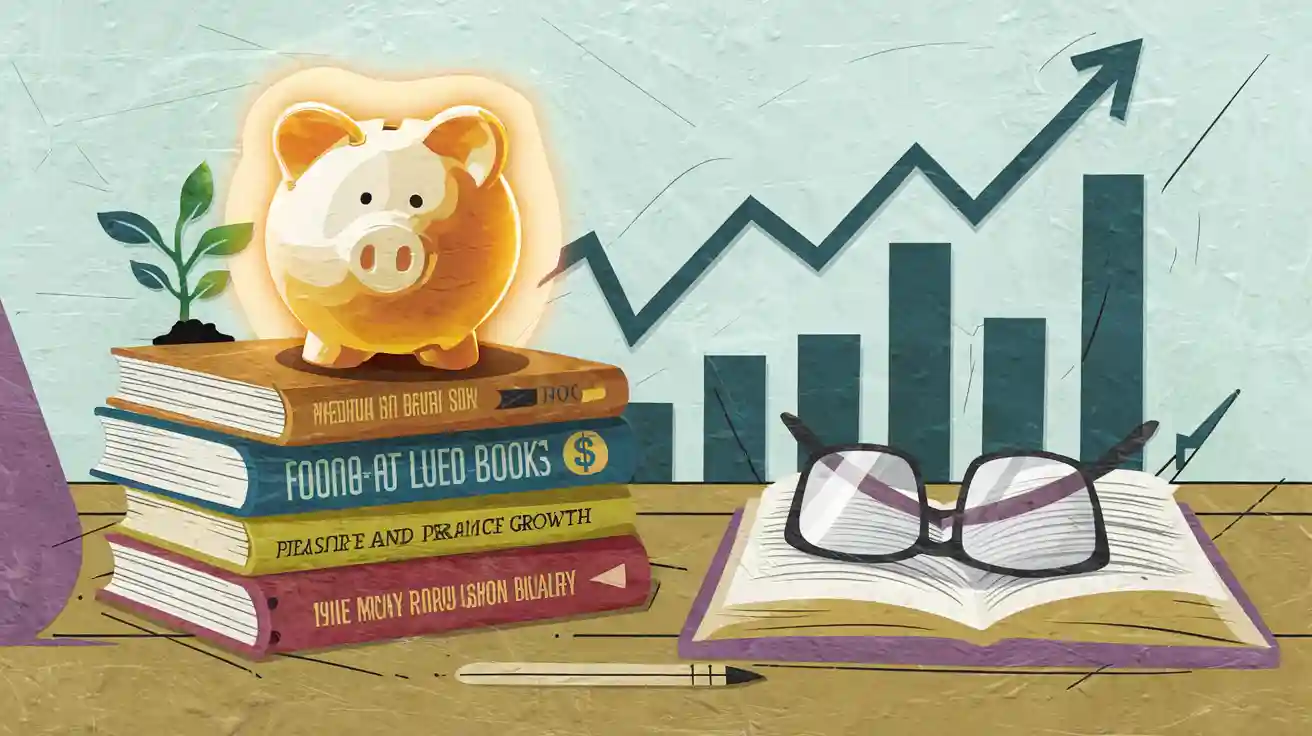
Your relationship with money shapes your life in profound ways. In 2025, embracing a fresh money mindset can unlock doors to financial independence and wealth creation. Financial literacy is not just about numbers; it’s about making smarter money decisions that lead to financial happiness and personal growth.
The right financial education empowers you to take control of your finances. By diving into must-read books on finance, you’ll discover actionable strategies to improve your finances and build habits of millionaires. These finance books offer more than tips—they provide a roadmap to change your life and achieve financial growth.
Key Takeaways
Change how you think about money by reading helpful finance books.
Learn to grow your savings and stay calm when making money choices.
Stick to a plan for saving and paying off debt to stay secure.
Spend on things that matter to you, not just to get rich.
Begin with easy steps to grow your money over time.
1. Rich Dad Poor Dad
Author: Robert T. Kiyosaki
Summary:
“Rich Dad Poor Dad” is one of the most influential must-read books on financial literacy. It challenges traditional beliefs about money and introduces a fresh perspective on building wealth. Through the contrasting lessons of two father figures—his own educated but financially struggling father (Poor Dad) and his friend’s wealthy, entrepreneurial father (Rich Dad)—Kiyosaki teaches you how to think differently about personal finance. The book emphasizes the importance of financial education, focusing on creating income-generating assets rather than relying solely on a paycheck. It inspires you to take control of your financial future by adopting an entrepreneurial mindset and leveraging resources to achieve financial independence.
Key Takeaways:
Mind Your Own Business: Take charge of your financial future by seeking new income sources and focusing on building assets.
Use the Power of Leverage: Accelerate wealth creation by utilizing others’ resources, such as time, money, or expertise.
Learn to Control Your Emotions: Avoid poor financial decisions driven by fear or greed.
Focus on Building Assets: Concentrate on acquiring income-generating assets instead of liabilities.
Work to Learn, Not for Money: Prioritize learning valuable skills that contribute to long-term success.
Principle | Description |
|---|---|
Understand the difference between what you own and what you owe. | |
Cash Flow vs Capital Gains | Recognize the importance of cash flow in wealth building. |
Good Debt and Taxes | Use debt strategically to enhance wealth. |
Financial Decisions | Take control of your financial choices to secure your future. |
Since its publication, “Rich Dad Poor Dad” has sold over 32 million copies, transforming how readers approach money. It encourages you to shift from traditional financial thinking to an entrepreneurial mindset. By focusing on creating assets and controlling emotions, you can build a sustainable path to financial freedom. This book is a cornerstone for anyone looking to reshape their relationship with money and achieve lasting wealth.
2. The Total Money Makeover
Author: Dave Ramsey
Summary:
“The Total Money Makeover” is a must-read book that offers a straightforward, no-nonsense approach to achieving financial stability. Dave Ramsey provides a step-by-step plan to help you take control of your money, eliminate debt, and build lasting wealth. This book emphasizes the importance of discipline and commitment in transforming your financial habits. Ramsey’s strategies focus on creating a solid foundation for personal finance, making it easier for you to achieve your long-term goals. Whether you’re struggling with debt or looking to improve your financial literacy, this book provides actionable advice to guide you toward financial freedom.
Key Takeaways:
Ramsey’s plan is built on seven key steps, often referred to as the “Baby Steps.” These strategies are designed to help you manage your money effectively and start investing wisely. Here’s a breakdown of the steps:
Step Number | Strategy Description |
|---|---|
1 | Save $1,000 as a starter emergency fund for unexpected expenses. |
2 | Focus on paying off the smallest debt first to build momentum. |
3 | Save three to six months’ worth of living expenses. |
4 | Invest 15% of household income into retirement accounts. |
5 | Save for children’s college education using tax-advantaged accounts. |
6 | Focus on paying off the mortgage early. |
7 | Continue building wealth and give generously. |
These steps encourage you to prioritize financial security while also planning for the future. By following this plan, you’ll learn how to avoid common financial pitfalls and start investing wisely. Ramsey’s approach is practical and achievable, making it one of the most impactful books for anyone looking to transform their personal finance journey.
If you’re ready to take charge of your finances, “The Total Money Makeover” will inspire you to make lasting changes. It’s not just about managing money—it’s about creating a life of financial freedom and generosity.
3. Your Money or Your Life
Author: Vicki Robin and Joe Dominguez
Summary:
“Your Money or Your Life” is a groundbreaking guide that redefines how you view money and its role in your life. This must-read book introduces a transformative approach to financial independence by focusing on the concept of “enough.” Instead of chasing endless wealth, it encourages you to align your spending with your values and prioritize personal fulfillment. The authors challenge consumer culture and traditional beliefs about success, urging you to rethink your relationship with money. By adopting their strategies, you can achieve financial freedom, reduce stress, and create a life filled with purpose and balance.
The book emphasizes that financial independence means having enough income to cover your basic needs without relying on a traditional job. It’s not about accumulating wealth for its own sake but about gaining the freedom to make meaningful life choices. This shift in perspective helps you focus on what truly matters, whether it’s spending more time with loved ones, pursuing passions, or contributing to your community.
Key Takeaways:
Redefine Financial Independence:
Financial independence isn’t about being rich. It’s about having the freedom to live authentically and pursue what brings you joy.Question Consumer Culture:
Challenge societal norms that equate success with material possessions. Instead, focus on what adds value to your life.Embrace the Concept of “Enough”:
Learn to distinguish between needs and wants. This mindset helps you avoid unnecessary expenses and focus on building wealth that aligns with your goals.Transform Your Relationship with Money:
By understanding the true cost of your spending habits, you can make better financial decisions and achieve greater satisfaction.Practical Steps for Wealth Building:
The book provides actionable advice, such as tracking expenses, reducing debt, and investing wisely to create a sustainable financial future.
“There is a way to live an authentic, productive, meaningful life—and have all the material comforts you want or need. There is a way to balance your inner and outer lives, to have your job self be on good terms with your family self and your deeper self.”
Readers of this book often report profound changes in their lives. They reconnect with old dreams, reduce expenses, and increase savings. Many find that their relationships improve as they align their values with their lifestyle. By integrating these lessons, you can simplify your finances, reduce stress, and focus on what truly matters. “Your Money or Your Life” is more than a book—it’s a blueprint for living a life of purpose and financial freedom.
4. The Millionaire Next Door
Author: Thomas J. Stanley and William D. Danko
Summary:
“The Millionaire Next Door” reveals the surprising habits and behaviors of America’s wealthiest individuals. Unlike the flashy lifestyles often associated with millionaires, this book shows that true wealth comes from discipline, frugality, and intentional financial choices. Stanley and Danko studied real-life millionaires and discovered that most of them live modestly, save diligently, and prioritize long-term financial goals over short-term gratification.
This must-read book challenges the stereotype of wealth as extravagant spending. Instead, it highlights how ordinary people can achieve extraordinary financial success by adopting simple, consistent habits. It’s not about how much money you make but how you manage it.
Key Takeaways:
Live Below Your Means: Wealthy individuals often avoid luxury lifestyles. They focus on saving and investing instead of spending.
Be Intentional with Money: Millionaires create budgets and stick to them. They track their expenses and avoid unnecessary debt.
Focus on Financial Independence: Building wealth requires long-term thinking. Millionaires prioritize financial freedom over impressing others.
Choose the Right Career: Many millionaires work in unglamorous but stable professions. They value consistency and hard work.
Teach Financial Literacy: Wealthy families pass down financial knowledge to ensure future generations continue building wealth.
“Wealth is not the same as income. If you make a lot of money each year and spend it all, you are not getting wealthier. You are just living high.”
Research supports these findings. The Affluent Market Institute (AMI) emphasizes the importance of behaviors and attitudes in wealth accumulation. Dr. Thomas J. Stanley’s studies highlight frugality, financial discipline, and long-term thinking as key traits of millionaires.
Research Source | Key Findings |
|---|---|
Affluent Market Institute (AMI) | Focus on behaviors and attitudes necessary for wealth accumulation |
Dr. Thomas J. Stanley’s Studies | Emphasizes frugality, financial discipline, and long-term thinking |
By following these principles, you can transform your financial habits and build lasting wealth. This book inspires you to rethink your relationship with money and focus on what truly matters—financial independence and security.
5. I Will Teach You to Be Rich
Author: Ramit Sethi
Summary:
“I Will Teach You to Be Rich” is a practical and empowering guide to mastering your finances without sacrificing the joys of life. Ramit Sethi offers a refreshing approach to personal finance, focusing on systems and strategies that simplify money management. Instead of rigid budgets, the book encourages you to define your “Rich Life”—a personalized vision of financial success that aligns with your values and passions. Sethi’s advice emphasizes automation, conscious spending, and smart investing, making it easier to achieve financial freedom while enjoying the journey.
This must-read book challenges traditional financial advice by prioritizing growth and enjoyment over guilt and deprivation. It reassures you that building wealth doesn’t mean giving up on the things you love. Whether you’re looking to pay off debt, grow your income, or create a sustainable investment portfolio, this book provides actionable steps to help you succeed.
Key Takeaways:
Adopt a Conscious Spending Plan: Spend on what truly matters to you while cutting back on areas that don’t bring joy.
Define Your Rich Life: Create a vision of financial success that reflects your personal goals and lifestyle.
Automate Your Finances: Set up systems to automatically save, invest, and pay bills, reducing stress and ensuring consistency.
Focus on Growth: Prioritize increasing your income and building a strong investment portfolio to accelerate wealth creation.
Efficient Debt Repayment: Use targeted strategies to eliminate credit card debt and free up resources for future goals.
Strategy | Description |
|---|---|
Rich Life Definition | Define what financial success means to you, including lifestyle goals. |
Money Management | Simplify finances with systems that reduce confusion and guilt. |
Automatic Savings | Automate savings and investments for hassle-free financial growth. |
Conscious Spending | Spend intentionally on what brings joy while minimizing unnecessary costs. |
Investment Portfolio | Build a portfolio that outperforms traditional advice. |
Debt Repayment | Pay off debt efficiently to free up resources for wealth-building. |
Income Growth | Focus on increasing income to improve financial health. |
“A Rich Life is yours to define. It’s not about cutting out lattes—it’s about spending extravagantly on the things you love and cutting costs mercilessly on the things you don’t.”
Readers and financial experts praise this book for its practical, positive perspective. It shifts your focus from strict budgeting to systems that work for you. By following Sethi’s advice, you can achieve financial freedom while enjoying life’s pleasures. This book inspires you to think differently about money and take control of your financial future.
6. Think and Grow Rich
Author: Napoleon Hill
Summary:
“Think and Grow Rich” is a timeless classic that has inspired millions to achieve their dreams. Napoleon Hill distills the secrets of success into actionable principles, emphasizing the power of mindset and determination. This book teaches you how to harness your thoughts, emotions, and subconscious mind to create a life of abundance. Hill’s philosophy revolves around having a burning desire, a clear purpose, and unwavering faith in your ability to succeed.
The book also highlights the importance of visualization and imagination in shaping your reality. By reprogramming your subconscious mind, you can align your actions with your goals. Hill’s principles are not just about accumulating money but about achieving fulfillment and personal growth. Whether you’re striving for financial independence or personal success, this book provides a roadmap to turn your dreams into reality.
Key Takeaways:
Have a Burning Desire: Success begins with a strong desire backed by a definite purpose. This clarity drives your actions and keeps you focused on your goals.
Harness the Power of Visualization: Imagine your success vividly. Your brain’s Reticular Activating System filters out negativity, allowing positive thoughts to shape your subconscious mind.
Control Your Emotions: Passion fuels success, but it must be guided by rational thinking. Emotional control ensures you stay on track.
Reprogram Your Subconscious: Visualization and imagination influence your subconscious, helping you create the life you desire.
Focus on Financial Goals: A clear plan for managing money and building wealth is essential for long-term success.
“Whatever the mind can conceive and believe, it can achieve.”
Hill’s insights are rooted in both psychology and history. He explains how the emotional brain, including the amygdala, drives passion and how the prefrontal cortex helps you stay disciplined. By applying these principles, you can transform your financial mindset and unlock your potential. This book is a must-read for anyone seeking to master their finances and achieve lasting success.
7. The Psychology of Money

Author: Morgan Housel
Summary:
“The Psychology of Money” explores the profound role psychology plays in shaping your financial decisions. Morgan Housel emphasizes that managing money is less about technical knowledge and more about understanding human behavior. This book dives into how emotions, experiences, and perceptions influence your financial choices. It challenges you to rethink traditional approaches to wealth-building by focusing on the mindset behind financial success.
Housel’s insights are especially relevant in today’s unpredictable world. He highlights the importance of adaptability and planning for the unexpected. By understanding your personal goals and tailoring strategies to fit your life, you can create a financial plan that evolves with you. This book inspires you to embrace a balanced approach to risk, frugality, and long-term thinking, helping you achieve freedom and control over your financial future.
Key Takeaways:
Personal Experiences Shape Decisions: Your financial choices often reflect your unique life experiences rather than universal truths.
Saving Over Earning: Building wealth depends more on how much you save than how much you earn.
The Power of Compounding: Small, consistent actions over time lead to significant financial growth.
Luck and Risk Matter: Success often involves a mix of good fortune and calculated risks.
Balance Risk and Frugality: A sustainable financial plan requires balancing cautious spending with calculated risks.
Failures Are Part of the Process: Mistakes are inevitable but offer valuable lessons for future success.
💡 “Financial success isn’t about intelligence—it’s about behavior. Small habits, patience, and adaptability can lead to extraordinary results.”
Housel’s lessons apply to modern challenges. Adaptability helps you navigate economic uncertainty. Planning for unexpected events ensures stability. Defining your financial goals allows you to create strategies that align with your life. A flexible plan evolves as your priorities change, ultimately giving you freedom and control over your life. This book is a must-read for anyone seeking to master the psychology of money and build lasting wealth.
8. Broke Millennial
Author: Erin Lowry
Summary:
“Broke Millennial” is a relatable and practical guide for young adults navigating the often overwhelming world of personal finance. Erin Lowry breaks down complex financial concepts into simple, actionable steps, making it easier for you to take control of your money. This book addresses common challenges like budgeting, managing debt, and understanding credit scores. It also dives into topics like investing, negotiating salaries, and leveraging workplace benefits to build a secure financial future.
Lowry’s conversational tone and real-life examples make this book approachable, even if you’re new to managing your finances. She emphasizes that financial success isn’t about earning a six-figure salary but about making intentional choices with the resources you have. Whether you’re drowning in student debt or just starting to save, “Broke Millennial” equips you with the tools to create a solid foundation for long-term wealth.
Key Takeaways:
Simplify Budgeting: Find a budgeting method that works for you, such as the 50/30/20 rule. This approach ensures you allocate money for needs, wants, and savings without feeling restricted.
Tackle Debt Strategically: Prioritize high-interest debt first or use the debt snowball method to build momentum. Avoid minimum payments to prevent interest from piling up.
Understand Credit Scores: A good credit score opens doors to better financial opportunities. Pay bills on time and keep credit utilization low to maintain a strong score.
Start Investing Early: Even small amounts can grow significantly over time. Contribute to retirement accounts like a 401(k) or IRA and explore low-cost index funds.
Build an Emergency Fund: Save three to six months’ worth of expenses in a high-yield savings account. Automating your savings makes this process easier.
Talk About Money: Open conversations about finances with friends, partners, and employers. Negotiating salaries and raises can significantly improve your financial security.
Set Clear Goals: Use SMART goals to define your financial objectives. Regularly track your progress and adjust your strategies as needed.
💡 “Financial success isn’t about how much you earn—it’s about how you manage what you have.”
Lowry’s advice empowers you to take charge of your financial journey. By applying her strategies, you can overcome common money challenges and build a future filled with stability and confidence. This book is a must-read for anyone looking to transform their financial habits and achieve lasting success.
9. The Barefoot Investor
Author: Scott Pape
Summary:
“The Barefoot Investor” is a practical guide to achieving financial independence and building long-term wealth. Scott Pape simplifies complex financial concepts into actionable steps that anyone can follow. The book focuses on creating a clear plan for managing your money while prioritizing what truly matters to you. Pape’s strategies emphasize intentional spending, saving, and investing to secure your financial future.
What sets this book apart is its relatable approach. It includes real-life stories of individuals who transformed their financial lives using these methods. These stories inspire you to take action and show that financial freedom is achievable for everyone. The book’s focus on long-term security over short-term gratification ensures that you build a sustainable financial foundation.
Pape’s advice is straightforward and empowering. By following his guidance, you can develop the skills and habits needed to take control of your finances and create a life of stability and purpose.
Key Takeaways:
Focus on What Matters: Align your spending with your values to create a life that brings you joy and fulfillment.
Make Intentional Choices: Spend wisely by distinguishing between needs and wants. This approach helps you avoid unnecessary expenses.
Build Financial Knowledge: Educate yourself about saving, investing, and managing money effectively. Knowledge is the key to financial independence.
Prioritize Long-Term Security: Think beyond immediate gratification. Save and invest consistently to secure your future.
Simple, Actionable Steps: Pape’s strategies are easy to implement, making financial success accessible to everyone.
💡 “The Barefoot Investor” reminds you that financial freedom isn’t about earning more—it’s about making smarter choices with what you have.
This book inspires you to take charge of your financial journey. By applying its principles, you can simplify your finances, reduce stress, and build a secure future. Whether you’re just starting out or looking to improve your financial health, this book offers a roadmap to success.
10. Financial Freedom
Author: Grant Sabatier
Summary:
“Financial Freedom” by Grant Sabatier is a powerful guide to achieving early retirement and living life on your terms. This book challenges the traditional notion of working until your 60s by showing you how to build wealth faster and smarter. Sabatier shares his personal journey from being broke to becoming financially independent in just five years. He emphasizes the importance of increasing your savings rate, investing wisely, and aligning your spending with your values.
This book inspires you to rethink your relationship with money and time. It’s not just about accumulating wealth but about creating a life filled with purpose and freedom. Sabatier provides actionable strategies to help you take control of your finances and design a future where you can focus on what truly matters.
Key Takeaways:
Evaluate Your Current Situation: Start by assessing your savings rate and spending habits. Understanding where your money goes is the first step toward financial freedom.
Run the Numbers: Use tools like the T. Rowe Price Retirement Income Calculator to measure your progress. This helps you see how close you are to achieving your goals.
Adjust Key Levers: Identify areas to improve, such as increasing your savings rate, reducing unnecessary expenses, or optimizing your investment strategy.
Invest for Growth: Focus on building a diversified portfolio that grows over time. Compound interest is your greatest ally in creating wealth.
Align Spending with Values: Spend intentionally on things that bring you joy and cut back on what doesn’t. This approach ensures your money supports your goals.
Redefine Retirement: Early retirement doesn’t mean stopping work entirely. It’s about having the freedom to choose how you spend your time.
💡 “Financial freedom is about more than money—it’s about reclaiming your time and living a life of purpose.”
Sabatier’s advice empowers you to take bold steps toward financial independence. By following his strategies, you can break free from the paycheck-to-paycheck cycle and create a life where you control your time and choices. This book is a must-read for anyone ready to transform their financial future.
11. The Intelligent Investor
Author: Benjamin Graham
Summary:
“The Intelligent Investor” is a timeless masterpiece that teaches you how to approach investing with discipline and logic. Benjamin Graham, known as the father of value investing, emphasizes buying stocks at prices below their intrinsic value. This strategy, called value investing, ensures a margin of safety, protecting your investments from market volatility. Graham categorizes investors into two types: defensive investors, who focus on preserving capital and earning stable returns, and enterprising investors, who take calculated risks for higher rewards.
This book also warns against trying to time the market. Instead, Graham encourages you to conduct thorough research into a company’s financial health before investing. His principles remain relevant today, proving that successful investing is not about luck but about patience, knowledge, and emotional control.
Key Takeaways:
Value Investing: Focus on purchasing stocks priced significantly below their intrinsic value to ensure a margin of safety.
Know Your Investor Type: Defensive investors prioritize stability, while enterprising investors embrace risk for potential growth.
Avoid Market Timing: Trying to predict market movements often leads to poor decisions. Stick to a disciplined investment strategy.
Do Your Homework: Research a company’s financial health before investing. Knowledge is your greatest tool.
Understand Market History: Learn from past trends, such as the P/E ratio expansion from 6.3 to 22.9 between 1949 and 1961, which reflected shifts in public sentiment.
💡 “Successful investing is about managing risk, not avoiding it.”
Graham’s strategies highlight the importance of staying grounded during market fluctuations. He also advocates for shareholder activism, urging you to hold companies accountable for their performance. His insights remind you that building wealth takes time, patience, and a solid understanding of financial principles. This book is a must-read for anyone looking to master the art of investing and secure their financial future.
12. Atomic Habits
Author: James Clear
Summary:
“Atomic Habits” by James Clear is a transformative guide to building better habits and breaking bad ones. This book emphasizes that small, consistent changes can lead to remarkable improvements over time. Clear introduces the idea that habits are the compound interest of self-improvement. Every small action you take is a vote for the person you want to become. By focusing on systems rather than goals, you can create sustainable habits that align with your financial aspirations.
The book’s principles apply seamlessly to your financial journey. Whether you want to save more money, reduce debt, or build wealth, Clear’s strategies help you create lasting change. Instead of relying on willpower, you’ll learn to design your environment and routines to make good habits inevitable and bad habits harder to maintain. This approach ensures that your financial progress becomes automatic and effortless over time.
Key Takeaways:
Recognize and Break Negative Financial Habits: Track your spending to identify harmful patterns. Replace these with positive actions, like saving a fixed amount each month.
Use Implementation Intentions: Tie specific actions to triggers. For example, transfer a percentage of your paycheck to savings as soon as it arrives.
Avoid the Diderot Effect: Pause before making purchases to ensure they align with your financial priorities.
Practice Habit Stacking: Link new financial habits to existing routines. For instance, review your budget right after your morning coffee.
Leverage Social Influence: Surround yourself with people who have strong financial habits. Their discipline will inspire you to stay on track.
Embrace Progress Over Perfection: Focus on small, consistent improvements. Even minor changes can lead to significant financial growth over time.
💡 “Small habits, when repeated consistently, can lead to extraordinary results. Your financial transformation begins with one small step.”
By applying these principles, you’ll shift your identity to see yourself as a saver or investor. This mindset reinforces positive financial habits and ensures long-term success. “Atomic Habits” is one of the most impactful books for anyone looking to improve their relationship with money and achieve financial freedom.
13. The Simple Path to Wealth
Author: JL Collins
Summary:
“The Simple Path to Wealth” offers a refreshingly straightforward approach to achieving financial independence. JL Collins emphasizes simplicity in managing your money, making it accessible for anyone, regardless of their financial background. The book focuses on building wealth through smart, consistent decisions and avoiding unnecessary complexity. Collins advocates for investing in low-cost index funds, such as the Vanguard Total Stock Market Index Fund (VTSAX), which provides broad market exposure with minimal effort.
For younger investors, the advice is even simpler—invest in a single index fund and let compounding work its magic. Collins also stresses the importance of saving a significant portion of your income, avoiding debt, and maintaining a cash reserve for emergencies. By following these principles, you can create a financial plan that grows steadily over time and supports your long-term goals. This book inspires you to take control of your finances and build a secure future with minimal stress.
Key Takeaways:
Simplicity Wins: Focus on a straightforward investment strategy using two index mutual funds—VTSAX for stocks and VBTLX for bonds—along with a cash account.
Smart Money Moves: Save at least 50% of your income, avoid debt, and invest consistently in index funds to achieve financial independence.
Start Early: Younger investors can benefit from investing in a single index fund, allowing compounding to maximize returns over time.
Avoid Complexity: A simple financial plan is easier to manage and more effective in the long run.
Stay Disciplined: Stick to your plan, even during market fluctuations, to ensure steady growth.
💡 “The path to wealth doesn’t have to be complicated. A few smart decisions can lead to financial freedom and a life of abundance.”
Collins’ advice proves that managing money doesn’t require advanced knowledge or constant monitoring. By keeping things simple and focusing on what truly matters, you can achieve financial success without unnecessary stress. This book is a must-read for anyone looking to simplify their finances and build lasting wealth.
14. Die With Zero
Author: Bill Perkins
Summary:
“Die With Zero” challenges the traditional approach to saving and accumulating wealth. Bill Perkins argues that your financial resources should be used to create meaningful life experiences rather than leaving behind unspent money. The book emphasizes the importance of spending while you are healthy and capable, ensuring that you maximize joy and fulfillment during your lifetime. Perkins introduces the concept of “Time Buckets,” which organizes life into stages—your “go-go,” “slow-go,” and “no-go” years. This method helps you prioritize experiences based on your energy levels and abilities at different ages.
The book inspires you to rethink how you use your money. Instead of focusing solely on saving for the future, it encourages you to invest in experiences that create lasting memories. Perkins highlights that time is a finite resource, and delaying enjoyment can lead to missed opportunities. By aligning your financial decisions with your personal values, you can live a richer, more purposeful life.
Key Takeaways:
Spend Money on Experiences: Use your financial resources to create memories and happiness rather than accumulating unspent wealth.
Organize Life into Time Buckets:
Plan experiences for your “go-go” years when you are active and adventurous.
Save simpler activities for your “slow-go” years when your energy begins to decline.
Reserve minimal effort tasks for your “no-go” years when physical limitations set in.
Recognize the Value of Time: Time is limited. Prioritize experiences that matter most to you while you can fully enjoy them.
Avoid Over-Saving: Saving excessively for the future can prevent you from enjoying the present. Strike a balance between financial security and living fully.
Align Spending with Values: Focus on what truly brings you joy and fulfillment.
💡 “Your money is a tool to create the life you want. Don’t wait too long to use it.”
“Die With Zero” inspires you to live intentionally and make the most of your financial resources. By applying its principles, you can create a life filled with purpose, joy, and unforgettable experiences.
15. Money: Master the Game
Author: Tony Robbins
Summary:
“Money: Master the Game” is a powerful guide to achieving financial security and freedom. Tony Robbins distills wisdom from some of the world’s top financial experts, including Warren Buffett and Ray Dalio, into actionable steps you can follow. This book simplifies complex financial concepts, making them accessible to everyone, regardless of your current financial knowledge. Robbins emphasizes the importance of taking control of your financial future by understanding the rules of the game and making informed decisions.
The book inspires you to think differently about money. It encourages you to focus on long-term wealth-building strategies, such as creating a lifetime income plan and investing wisely. Robbins also highlights the importance of maximizing Social Security benefits to enhance retirement security. His advice empowers you to take charge of your finances and build a life of abundance and purpose.
Key Takeaways:
Maximize Social Security: Learn how to optimize your benefits to secure a stable retirement.
Understand the Rules: Becoming an insider helps you make smarter financial decisions.
Make the Game Winnable: Set clear, achievable financial goals that align with your values.
Invest Like the Wealthiest: Adopt strategies used by the top .001% to grow your wealth.
Create Lifetime Income: Develop a plan that ensures financial stability throughout your life.
Take Action: Start implementing these strategies today to enjoy financial freedom and share your success with others.
💡 “The secret to wealth is simple: Take control of your financial decisions and make them work for you.”
Robbins’ step-by-step approach makes financial freedom feel attainable. By following his advice, you can transform your relationship with money and create a future filled with security and opportunity. This book is a must-read for anyone ready to master the game of money and live life on their terms.
These must-read books have the power to transform your relationship with money. Each one offers unique insights and practical strategies to help you take control of your financial future. Start with the book that resonates most with your current goals. Whether you want to build wealth, eliminate debt, or redefine your financial priorities, there’s a guide here for you. Remember, improving your relationship with money is a journey. Every step you take brings you closer to a brighter, more secure future. You’ve got this!
FAQ
What is the best book to start with if I’m new to personal finance?
Start with “Rich Dad Poor Dad” by Robert T. Kiyosaki. It introduces foundational concepts like assets, liabilities, and financial independence in an easy-to-understand way. This book will shift your mindset and inspire you to take control of your financial future.
💡 Tip: Focus on understanding the difference between assets and liabilities—it’s a game-changer!
How can I apply lessons from these books to my daily life?
Break down the advice into small, actionable steps. For example, automate your savings, track your expenses, or start investing in low-cost index funds. Consistency is key. Small habits, like those in “Atomic Habits”, can lead to big financial changes over time.
Are these books suitable for all age groups?
Absolutely! These books cater to a wide audience. Whether you’re a teenager learning about money or an adult planning for retirement, you’ll find valuable insights. Books like “Broke Millennial” are perfect for younger readers, while “The Intelligent Investor” suits those ready to dive deeper into investing.
Do I need prior financial knowledge to understand these books?
Not at all! Many of these books, like “The Barefoot Investor” and “I Will Teach You to Be Rich”, are written in simple language. They explain complex concepts in a way that’s easy to grasp, even if you’re just starting your financial journey.
How long will it take to see results after applying these strategies?
Results depend on your goals and commitment. Some changes, like building an emergency fund, can happen quickly. Others, like growing investments, take time. Stay consistent and patient. Remember, as “The Psychology of Money” teaches, wealth-building is a marathon, not a sprint.
💡 Success comes from steady progress. Celebrate every small win along the way!






